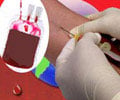- Celebrating 20 years of World Blood Donor Day with the theme "20 years of celebrating giving: thank you blood donors!”
- Reinforcing the importance of regular blood donation to ensure a steady supply of safe blood for medical emergencies and treatments
- Expressing profound appreciation for voluntary blood donors and their life-saving contributions
World Blood Donor Day 2024
Go to source).
Blood donation can save up to three lives with just one pint! #medindia #blooddonation #bloodonorday’
Theme for World Blood Donor Day
The theme for World Blood Donor Day 2024 is "20 years of celebrating giving: thank you blood donors!" This theme marks a significant milestone – the 20th anniversary of the day – and aims to acknowledge the profound impact blood donors have had on countless lives around the world.History of World Blood Donor Day
World Blood Donor Day was first established in 2004 by four core international organizations: the World Health Organization (WHO), the International Federation of Red Cross and Red Crescent Societies, the International Federation of Blood Donor Organizations (IFBDO), and the International Society of Blood Transfusion (ISBT). The date, June 14th, coincides with the birthday anniversary of Karl Landsteiner, the Nobel Prize-winning scientist who discovered the ABO blood group system. This discovery revolutionized blood transfusions by enabling blood typing, ensuring compatibility between donors and recipients.Significance of World Blood Donor Day
World Blood Donor Day holds immense significance for several reasons:Raising Awareness: The day acts as a critical reminder of the constant need for safe blood. Blood transfusions are essential for various medical procedures, including surgeries, accident victims, and individuals with blood-related illnesses.
Appreciation for Blood Donors: It provides a dedicated platform to acknowledge and thank voluntary blood donors. Their selfless act of donating blood has the power to save lives and improve the health of countless individuals.
Promoting Regular Blood Donation: World Blood Donor Day encourages people to become regular blood donors. A consistent blood supply is crucial to meet the ongoing demand for transfusions.
Addressing Challenges: The day also highlights the challenges faced by national blood programs. This allows for discussions and solutions to ensure sustainable blood collection practices and readily available blood for those in need.
Celebrating Achievements: World Blood Donor Day is an opportunity to celebrate the achievements and advancements made in the field of blood donation. It allows for the recognition of progress and promotes a culture of regular blood donation among young people and the general public.
Who Can and Cannot Donate Blood
While most people can be blood donors, there are some general guidelines to ensure the safety of both the donor and the recipient.Who Can Donate Blood?
Generally, you can donate blood if you meet the following criteria:
- Age: The minimum age for blood donation varies depending on location. In most countries, it’s 17 or 18, with some allowing 16-year-olds with parental consent. The upper age limit is typically 60 or 65, though some regular donors may be able to exceed this with a doctor’s approval.
- Weight: You should weigh at least 50 kg (110 lbs) in most places.
- Health: You must be in good general health at the time of donation. This means being free from colds, flu, fever, or any other infections.
- Hemoglobin Levels: Your blood iron levels, measured by hemoglobin, need to meet a minimum threshold to ensure sufficient red blood cells for donation.
- Lifestyle Habits: Certain lifestyle habits may temporarily disqualify you from donating. These include recent tattoos or piercings, travel to certain regions, and risky sexual behaviors.
Who Cannot Donate Blood?
There are certain conditions that may permanently disqualify you from blood donation.
- Serious Medical Conditions: Individuals with chronic illnesses like heart disease, cancer, or uncontrolled diabetes typically cannot donate.
- Blood-borne Diseases: People who carry certain blood-borne diseases like HIV, hepatitis B, or hepatitis C cannot donate.
- Certain Medications: Taking specific medications may make you ineligible for temporary or extended periods.
- Recent Illness or Infections: Those with active infections or recent illnesses (such as the flu or cold) should wait until fully recovered before donating.
- Autoimmune Disorders: Conditions like lupus or multiple sclerosis may disqualify you from donating.
- Blood Disorders: Individuals with blood clotting disorders, such as hemophilia, are typically ineligible.
- Pregnancy and Recent Childbirth: Pregnant women and those who have recently given birth (typically within the last six weeks) cannot donate.
- Recent Surgeries or Medical Procedures: If you’ve had recent surgery or certain medical procedures, you may need to wait a specific period before donating.
- Travel History: Recent travel to areas with high risk of malaria or other infectious diseases may temporarily disqualify you.
- Lifestyle Factors: High-risk behaviors such as intravenous drug use or certain high-risk sexual behaviors can permanently or temporarily disqualify you.
- Vaccinations: Recent vaccinations may require a waiting period before you are eligible to donate.
- Recent Tattoos or Piercings: If done in a non-state-regulated entity or with non-sterile needles, you may need to wait a certain period (usually 3 months).
- Low Hemoglobin Levels: Individuals with anemia or low hemoglobin levels are temporarily disqualified until levels normalize.
- Transfusions and Organ Transplants: Recent blood transfusions or organ transplants can disqualify you temporarily or permanently.
Reference:
- World Blood Donor Day 2024 - (https://www.who.int/campaigns/world-blood-donor-day/2024)
Source-Medindia














